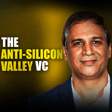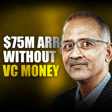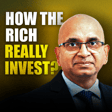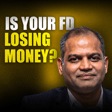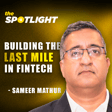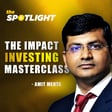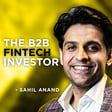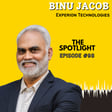Become a Creator today!Start creating today - Share your story with the world!
Start for free
00:00:00
00:00:01

Rajat Mehta on angel investing and the power of communities | JITO JIIF
Rajat Mehta is a driving force behind mobilizing Jain community investments in startups. He shares valuable insights into angel investing and harnessing the strength of communities. Offering practical advice for founders seeking funding, he delves into topics ranging from managing cap tables to utilizing social proof effectively. Learn what investors look for, how startups can demonstrate their potential, and the varying scalability of different types of businesses.
Get notified about the latest releases and bonus content by subscribing to our newsletter at www.founderthesis.com
Transcript
Introduction to Rajat Mehta and JIF
00:00:01
Speaker
Hi everyone. Good afternoon. I am Rajat Mehta. I'm in financial services. I also run an angel network and an incubation center, which is called JIF, Jito Incubation and Innovation Foundation.
The Power of the Jane Community
00:00:26
Speaker
This episode is a masterclass in the power of community. Rajat Mehta is a part of the highly entrepreneurial Jane community. And by the end of this episode, you will be convinced about the power of this community and their contribution towards supporting startups in India. Rajat Mehta is helping the Jane community to invest in startups as an asset class while also supporting visionary entrepreneurs with capital and the power of the community. And he shares his stake on his learnings as an angel investor.
00:00:55
Speaker
And of course, this episode is full of insightful advice for founders on how to raise funds from angel investors and the importance of nurturing your relationship with investors.
Rajat's Journey into Angel Investing
00:01:04
Speaker
Stay tuned and subscribe to The Sounder Thesis Podcast on any audio streaming platform for more advice on scaling your startup.
00:01:22
Speaker
Okay. So I want to kind of understand your journey of getting into angel investing. Angel investing is a fairly new asset category for most investors, but you are a seasoned investor. I just want to understand where you're coming from. What's your journey been like?
Lessons from Investment Failures
00:01:41
Speaker
So I joined our family business and I found myself to be pretty underutilized because almost all the businesses were running in autopilot.
00:01:51
Speaker
And what was your family business? So we are into broking, investment banking, wealth management, NBFC. And you know, at that point in time in 2015, I joined it on 13-14 and I just saw some of these people talking about startups and investing as angel investors. And you know, an interesting startup came knocking through a common connect.
00:02:20
Speaker
I said, let's look at this. We did a lot of extensive homework on the company. Now we don't spend so much time as we did back then. I wish we do. But since it was the first one, we spent almost three, three and a half, four months just trying to understand what this animal is all about. Unfortunately, with all that effort, the company went bust in three months.
00:02:44
Speaker
Oh, okay. Yeah. It was an interesting, but it was invested. Yeah. I invested 25 lakhs. Okay.
00:02:55
Speaker
But because of me, three or four people who trusted me, collectively put in a crore. And losing a crore in just three months at the beginning of your career, money which is not earned by you is not a pretty good situation because then you go back to sitting in your family business and telling them that basically
00:03:20
Speaker
Yeah, this is a completely stupid idea. We should probably stick to what we know best. But you know, that didn't stop us because some of the people in the syndicate or people who believe that I could probably understand the space sort of really
Success and Challenges with Investments
00:03:39
Speaker
supported me. And they said, you know, this is a good thing. It's early learning for you.
00:03:44
Speaker
So, you know, don't stop, don't stop here. And we want to build this asset class as a part of our allocation. So, and we want you to lead it. And I thank them because, you know, going to them, talking to them about making the loss within just three months means we've done some terrible, you know, judgment sort of analysis. So that, you know, made me also look at some other opportunities. And I came across the Ashwarya.
00:04:14
Speaker
And he was running a company called Drivesy. And very interesting, you know, I met this Bangalore based founder and we met at Starbucks at that point. And a common friend of mine, Puneet Goel, introduced me to him saying, you know, I'm putting in a small check. Why don't you come? I know.
00:04:35
Speaker
And then by then I'd already lost some money in my first investment. So I said, let's get some smart people to look at this instead of me doing all the homework again. So I got five people who started investing before me, maybe six months, one year, two years before me. I said, if they can validate it, it'll be much easier for me to do this. So let's learn it their way instead of trying to sort of recreate.
00:04:58
Speaker
So, you know, I brought about seven of them to meet for 30 minutes each at Starbucks assignment point and out of the seven, six actually committed. And then, you know, obviously I committed to the company along with who now runs the company called Blue Smart. So I'll tell you the story later. So.
00:05:20
Speaker
Yeah, then we invested in DriveZ, we saw it really do well, got selected by Y Combinator, I lifted my morale saying I selected a company which went to the valley. So maybe we did something right. And then they were funded by very good Japanese VCs. So I think they were on a very good track until COVID and then things went bad. Third investment was very interesting. We got a chance to invest in Grove.
00:05:48
Speaker
And that was like a blockbuster for us. We started interacting with Harsh and Nalit, not so much Ishaan and Neeraj, but more than Harsh. And they were doing the same business that we were doing for 30 years or 25 years, my father. And I said, it'll be interesting to see how
00:06:09
Speaker
You know, they build this better than us. And I'm always of the opinion that people can do things better than I do. So I said we can learn from them. So we put a small token and they weren't really very keen to take any money from the market rather. So, but just they took three checks in the beginning. I think it was three checks. And then, you know, and then rest is history, of course. What values did you invested?
00:06:39
Speaker
I think it was 1.2 or 1.5 million. Wow. And today's 3 billion is the most recent valuation. Amazing. Incredible. But I exited. Okay. Okay. When did you exit at the unicorn round? No, 20 early. So we didn't see that. Okay. But you know, no regrets. I think even in terms of multiples back then, it was just amazing. Yeah, I can advise it.
00:07:08
Speaker
Wow. Amazing.
Key Learnings from Investment Experiences
00:07:10
Speaker
What was your learning from the first failure? Very interesting. You know, the guy running it, the founder, he was a very good, you know, he was a perfect founder. 9 on 10, 10 on 10.
00:07:32
Speaker
a tech guy, a young, with a zeal to do something very interesting, farm to fresh. But he was supported by an extremely passionate, traditional promoter who sort of came in as a co-founder, co-promoter.
00:07:53
Speaker
The age gap between them was about 30 years. The way both of them worked was very different.
00:08:02
Speaker
I don't think they understood each other in terms of how they could scale the business together. So basically the gentleman who sort of came in as a financial investor ended up becoming an operational partner so that chemistry didn't work. And I think sometimes promoters and corporates, they tried to play a founder hat.
00:08:28
Speaker
with a young startup, with a young team, and that chemistry always doesn't gel. So I think people should understand that they should be financial investors and not try to be sharks every time. So that's the reality. And that's what happened. So I think once there is a misalignment, then for somebody who's already established,
00:08:53
Speaker
For them, it doesn't matter even if it gets killed in the process. If it's not their way or highway, if it's not their way or highway, then they'd rather just kill the whole show than sort of let it happen. So that's typically what happened in the first case. In the second case, in fact, Drizy, I think the company was poised to be a half a billion dollar company for sure. How do you spell it? D-R-I-V
00:09:23
Speaker
Okay. I think that company was a great track. I think from 1.5 or 2 million entry value for us, we saw it go to 150 million and they were raising around for 350 million value somewhere. I think a lot of.
00:09:42
Speaker
back timing, wrong decisions, entering the whole coins, ICOs, trying to do too much, not communicating with the investors.
00:09:55
Speaker
you know, talking to the investors only when things went bad and not talking to the investors regularly, not communicating regularly, not sending MISs after repeated requests. That was one of the challenges, but genius guys, you know, unfortunate that they couldn't pull it through. Okay.
The Importance of Communication with Investors
00:10:14
Speaker
Yeah. Okay. So when did BlueSmart happen? Right after Grow.
00:10:21
Speaker
Okay. So we saw our drive Z and actually Puneet from BlueSmart. Puneet from BlueSmart basically is a friend of mine. We walked together in Mumbai in the mornings and we've been friends for years. So we were pretty fed up with, you know, drive Z communication, the whole journey. He said, I think I can do this better. I said, do it. Yeah.
00:10:47
Speaker
I said that he was also in this, uh, you know, they were in, they were in, no, they were not right eating, but they were this, uh, you know, zoom car equivalent or zip car equivalent. Yeah. Self-driving car. Yeah. But they built this smart vehicle technology, et cetera, et cetera. And Puneet, uh, in his, uh, previous avatar was all about solar renewable. So he really understood the space and the man can just talk and sell and talk and sell.
00:11:13
Speaker
So three days, three days, four days walking with him, he's like, we're doing this, we're building this, we're doing this, we're doing this. I said, what will it take to sort of get you to stop talking? He said a check. But amazing, you know, the guy, the guy you cannot, you cannot argue with him.
00:11:32
Speaker
He's red, uber balance sheet, year on year, year after year, every year, you cannot argue with him. He knows his facts. He understands the space. And so you feel that you're in good hands. He can make mistakes. Things can go bad. Times can be bad, but the guy knows what he's doing. And the guy is like, he's on a mission.
00:11:53
Speaker
And this you're talking of Puneet Jagi or Puneet Goel? Puneet Goel. Puneet Goel. Okay. Okay. And then there's a dream team, right? Puneet is great with the facts and with the communication and Anmoor is a great executor. So I think, and I think their meeting also is a very interesting coincidence. Puneet was pitching to a very large corporate.
00:12:15
Speaker
And Anmol heard him and said, forget this, we'll know this together. And I think they are a very good sort of chemistry where one brings in the execution and one brings in excellent communication.
00:12:35
Speaker
And you're still invested with GloSpark? I am. In fact, I put in the first check, then I took it to JIF, which is our platform, which is 100% subsidy of Jito, JN International Trade Organization.
00:12:49
Speaker
And through, in fact, when I took it to JIF, Indian angel network, and I think one more angel network, we're looking at it, but we're very skeptical. They didn't take the plunge. And we took the plunge, in fact, and we did almost a little more than half a million or maybe close to a million dollars in the first round itself. And at that point in time, we had no validation from any VC or angel fund. We were fairly inexperienced.
00:13:19
Speaker
But I think, you know, we both worked well together. And today I think out of the 200 crores that JIF investors have invested, our angel network members in approximately 96 companies, 40 crores is just in blue spot alone.
00:13:37
Speaker
Wow, seven drops. So we believe in the promoters. I think they're building something very very nice If you happen to go to Delhi NCR, I think yeah, I I I have written by my favorite way of airport ride is blue smart only Yeah, the cars are clean the divers are on on point. I think it's a it's a good product. It's very important though
00:14:06
Speaker
They've not been able to raise as much money as they need to, right? Like off late. So when you're competing in this ride hailing market, your competitors are extremely well funded and you'll need to burn a lot of money to scale.
00:14:21
Speaker
Yeah, so I think I am not worried. I tell you why, because they have a few things going on, but the investors are fully ready to back them, existing investors, which is, which is very important. I tell you, if you communicate to your investors, existing investors consistently
00:14:37
Speaker
If your communication is on point, you tell them what's happening, you tell them all the goods and you tell them all the bads, they will support you. So they have raised the last two rounds by doing rights issue. Promoter themselves have put in very significantly, which shows that there's a lot of confidence because Promoter did not put in a penny change. Both of them put in a significant part of their network into the business.
00:15:05
Speaker
A, investors have gone in and put money in two rights issues right after another. And that is because people don't understand what's the rights issue.
00:15:19
Speaker
Rights issues are basically given to existing investors to reinvest in the company. In this case, the promoters also get a chance to increase their stake in case some of the existing shareholders don't accept the rights.
00:15:41
Speaker
The current shareholders in whatever percentage of ownership they have, they can in that percentage subscribe to the rights issue like if you're doing a 10 million round. I think yes they have not been able to raise a large external account but I can tell you
00:16:00
Speaker
that pending a few strategies, I think there are a few very serious large VCs, priority players who are looking at them and they are in the right space. They walk the mile. It's not an easy business, but they are here to stay.
00:16:17
Speaker
I think they're in so good markets, NCR and Bangalore. They will soon be in Middle East and Dubai. And I think they're on the right track. So I think it's a tough business. Everyone knows that. But I think if somebody can get it right, these guys want to do it.
00:16:35
Speaker
Interesting. You spoke of how Purith is the benchmark in terms of communicating with investors. What are some of the things that you can show that these are the good things that he did? Does he send a report with numbers and pie charts?
00:16:54
Speaker
A quarterly report comes to all angel networks, all VCs, all angel investors, all their investors, all types of investors. A quarterly sort of mail goes out, but they also back it up with a call with all the investors. That said, if somebody mails them or calls them,
00:17:17
Speaker
They don't mind talking about the same thing that they just did five days back or two days back. So I think they communicate well. It's very important. If you're building something and you cannot communicate to your early backers, I think that's not a good sign.
00:17:32
Speaker
There are situations where you cannot raise money with large VCs for whatever reason. The last two years have not been the way all founders or the entire startup ecosystem would have wanted. But if you have the trust and the support or the faith of your investors,
00:17:49
Speaker
then you will always have them back you and double down. And we have seen there is enough wealth in India. We've seen with the stock markets, people have enough money to sort of double down, triple down and in all kinds of dips. So I think as long as they believe you and they believe in the, in what your vision is, people will support you. Your existing guys will support you. You may last that you may, whatever you need for that period where you can't do a bigger round can be a sort of
00:18:19
Speaker
I managed in this spot this way. And what are the metrics? Like, is it a very numerical information that is shared or is it subjective? Like here's how our last quarter was or it's no, it's a mix of both the clean facts, you know, as is, you know, before as is and future. It's a complete crisp, you know, factual sheet with some fundamental things and some immediate opportunities for future.
00:18:49
Speaker
Okay. Interesting. Interesting. So, around BlueSmart is when you got into JIIF? Yeah, but I was then, yes. Around BlueSmart is when I got involved in JIF. I was then the vice chairman. I was about 30 years old, or 29. Tell me, how did that happen? How did you end up being a part of JIF?
JIF's Support for Startups
00:19:11
Speaker
Okay, so my father has been the president of JITO, Gen Rational Trade Organizations. He was amongst the early founders, first 15, 80 people who created this organization. And this was an organization created for all the Gen's across the world to sort of come under one organization and focus on very interesting projects like JIF.
00:19:33
Speaker
It's a very progressive sort of project that any community is doing. In fact, we have helped now after JIF's, I would say, success. You know, at least nine communities who have come and worked with us and tried to understand and replicate our constitution to build something like this. So our, I would not say just my father, but Motilal Aswal, my father, Akeesh Mehta, Mr. Pradhi Prathura Selo, who's also a backer of JIF,
00:20:02
Speaker
and Rajesh Jain, our director in charge right now. These are some of the guys, Anil Jain, Manoj Mehta. So these guys sort of realized that when we went to Silicon Valley in 2015, we met John Chambers of Cisco. We were a total delegation of 200 Jito members and we saw the ecosystem. We met VCs. We went to the campuses of Tesla, WhatsApp, Facebook.
00:20:27
Speaker
et cetera, Google. And then we really saw what incubation centers and startup enablers and angel networks were sort of doing in Silicon Valley. And then that's where the idea was conceived. And they said, you know, we have to be community first in achieving this. So we came back to Bombay. Ms. Pradip Ratoor of Celo said, you know, here's my office, 10,000 square feet free of cost.
00:20:56
Speaker
three years, you know, go for it. My father was the president. Then he said, let's start this project. Rajesh Jainji gave a name to this project. And then, you know, a team led by Manoj Mehta, Neel Jain, Vikas Kavar sort of put this through. We are six years old. We've incubated 55 companies. We have impacted 110 companies so far in the incubation.
00:21:23
Speaker
We are the only ones. What is the difference when you say 55 and 110? We may have worked with a lot many more companies like 110, but the final number of 55 comes from companies who stayed with us for three months, six months, one year, two years, where you worked with them end to end, from their idea to their go-to-market strategy, to helping them create the pitch, helping them connect with resources, getting their business, getting them into the market.
00:21:51
Speaker
getting them to pitch, helping them fundraise, etc. The entire journey of incubation. And these 55 companies are companies where Jeff has a stake in. Like I'm assuming incubator takes a stake. So out of those 55 companies, I think we would have stake in almost 44 of them. You know, of course, then there are some companies here and there. So about 40, 45 companies, we would have some stake. Okay. What is the incubator model? What does an incubator do?
00:22:21
Speaker
So incubation is basically, incubation is a popular term with hospitals, where hospitals incubate a newborn and support the life of that newborn. It's very similar to that. So to make it easy, as an incubation center or an incubator, we support a founder's journey to build a sort of a new age or a good business. So we help them in those early crucial years, months, where the support is needed.
00:22:48
Speaker
in the case of hospital, maybe oxygen support or nurse care. In case of incubators, when a founder comes to us, some already have an idea of what they want to do, some sort of, you know, have some basic sort of idea of what they want to do, but they don't know how to expand on it. So we help them get through that thinking phase. Then we help them put it on paper.
00:23:13
Speaker
And then we help them kickstart that, we help them get their companies registered, their structures in place, help them with their capital structure, help them find a founder if it's a single founder, help them connect with the light mentors. And at Jito, we do an excellent job of finding very, very good mentors because the community's power is such that let's say somebody wants to do something at FinTech.
00:23:35
Speaker
So let's start, you know, you want to meet Mr. Motilal Oswal, you want to meet Mr. Nirmal Jain, you want to meet Mr. Malabansali, you want to meet Mr. Nimesha, you want to meet Mr. Nilesha, you want to meet Mr. Prashan Jain, you name the guy from capital markets or financial services industry, you know, you'll have the top 20 guys in the country, you know, you'll have 90% of them being Jains or members of JIF rather, supporters of JIF, patrons of JIF.
00:24:04
Speaker
You talk about pharma, you know, we have three or four very, very large pharma founders promoters at Ajito network. You talk about healthcare. Likewise, you know, we have at least a dozen corporates in Jito who run large hospitals, mid-size hospitals, hospitals in tier two, three, four educational institutions. We have some of the best on educational institution owners as part of our network. So the expertise that we bring in is we bring in good mentors.
00:24:34
Speaker
And then we also bring in very good business supporters. So we are able to match that. And then of course, help these companies go to market, create a page strategy, raise money from within JIF platform. So we also have the Cheeto Angel Network at JIF, which helps these founders raise money.
00:24:58
Speaker
And then we have the Jito Shark Angels, which is something we started about two and a half years back. And I'll talk more about that. And it's done really well. In fact, I just came back from Dubai. And Mr. Mothila Nuswal, Mr. Vimal Shah of Bidco, he's an African conglomerate. And then Mr. Anil Singh, we have Z Business.
00:25:18
Speaker
and Mr. Vimal Kevsala and Sparsh Jain and Vinod Dugarjee from Kolkata, they were our sharks slash angels and a total of four startups got two and a half million dollars on stage just two days back. So we've been able to impact 20 companies with our shark angels initiative and a total of three and a half million dollars already been given to so about 25 crores, 30 crores already been given to
00:25:44
Speaker
these founders and I think about two and a half million dollars. Bish, Pachish, Corona, Rupiah or you know, I'm going to go into some of these companies and pitch to us on the live shaft. And these are events, are live events. So the first season was nine events, nine cities, 40,000 audiences online and offline.
00:26:02
Speaker
And the second season started with 600 people in Hyderabad at T-HUB, where Harsh Jain of Grove, Nitin Jain of All Business, Polki Jain of Vedantu, and Sunil, sorry, Munnar of Hapelo. Sunil Kumar Singhvi is a very early, you know, a very serious VC, angel investor. We had some of them as our sharks, angels. Nobody likes to get called sharks nowadays.
00:26:33
Speaker
No, I think that's not the case anymore. The shark tank has made bigger shark as cool. So we run three things at JIF. We run the incubation center, the angel network and the shark angel. And the angel network we've invested in almost 85 companies, a total of 160 crores.
00:26:53
Speaker
And then the shark piece is about 20 more companies, 25 more companies, and about 25 more. So we're managing about 200 crores of invested capital, which would be valued anywhere between 300 to 350 crores. We're managing a portfolio of 98 companies at JIF and a professional team of 18 employees, investment professionals around the clock to support our members.
00:27:24
Speaker
Okay.
Structure and Focus of Jito and JIF
00:27:25
Speaker
Interesting. Um, Jeff is a standalone private limited entity or what is it like? It's a hundred percent subsidy of Jito JN international trade organization. Is this a corporation? Is it a not-for-profit? How is it structured? It's a Section 8 company. What does that mean? Section is a, is a, is a for-profit company.
00:27:46
Speaker
Uh, but it's, it's a, yeah, it's a for-profit company, but it's a, it's usually used by, uh, you know, organizations like us, community organizations and stuff. Okay. But we have been, we've been a tax paying, uh, entity from day zero. JIF I'm talking about JIF. Okay. So we have about 625 members, uh, about 650 members, uh, from Jito community. And, uh, and yeah.
00:28:13
Speaker
And how does the organization pay the bills? Is there a revenue model or is it through contribution from Jito? No, there is a revenue model. We have a membership fee, a small membership fee from all our members. Who are the investors?
00:28:31
Speaker
So the membership fee is from JITA members who become members of JIF, but they don't pay anything after becoming a member. So that means we as JIF, we don't charge a carry or a profit share or any transaction with our members because we are here to support, sort of help our community, push our community to become leaders in the startup investing or the startup ecosystem and the landscape.
00:28:56
Speaker
So we have a membership model and we also charge a small fee from the companies that are raising capital via JIF platform. So the goal of JIF is
00:29:12
Speaker
to help the members get exposure to an alternate asset class through a systematic, organized, well-structured approach, basically. Absolutely. Two main objectives. You covered one. The other one is to help JN founders get firsthand support from our Jito community into building great businesses of future.
00:29:42
Speaker
Having said that, we have also invested. A majority of our portfolio is non-Gen companies. As long as they meet the principles of Genism, non-violence, no meat, no alcohol. So as long as those companies stick to these principles, we are happy to invest in any good opportunity that may help our Gen investors, Jito community members, Jito Angelito members, to sort of be ahead of the curve in the startup landscape.
00:30:11
Speaker
Having said that, a very interesting fact for you. We have about 111 unicorns. I think in India we have 111-12 unicorns.
00:30:27
Speaker
And out of that, 13 founders are JN founders, which is a pretty good number, right? If we only focus on these founders and we keep our target very clear, I'm sure that we will be able to create some very good unicorn opportunities for our members. I think in the Swinikon space, we would have almost upward of 50, 100 founders of JN background. Okay.
00:30:55
Speaker
So Jito is like a networking body for somebody who's running a business, like they would want to join Jito to connect to other JAN founders and thereby find business opportunities. Absolutely. So we run multiple projects at Jito. One of the projects is GBN, Jito Business Network. So that's where all this B2B happened.
00:31:19
Speaker
And the last tenure in 2022, at the end, about $200 million of B2B between the community. I think this year we landed half a billion dollar sort of business between the community. But we also have very interesting projects. We run a project called GEAP, Geetho Educational Assistance Program, which basically helps any needy scholarship. We run JATF, Geetho Administrative Training Foundation.
00:31:46
Speaker
That means any gen child who wants to enter civil services, IES, IPS, IFS, IRS, we sort of, we have created seven centers of excellence and we sort of help them, mentor them, guide them, provide them with a comfortable stay and food and sort of get bureaucrats to sort of help them, you know, crack these exams. So that has been a very successful project. We run a project where, where a shaman arogym, jito shaman arogym, 12,000
00:32:17
Speaker
priests of our Sadhu Sadhguru's have been given a cashless card. They can go into any hospital and give that card and get treatment free of cost. Jito bears it. We run Jito Ladies' Wing, which last year created Guinea's Book of World Record. They created this Ahamsa run.
00:32:37
Speaker
where people across the world got into a non-violence marathon. Last March, we have it this March again, 31st March, and Giri's book of World Record sort of acknowledged that as one of the largest events happening around 100 chapters at the same time. So we have about 70 chapters of Jito in India and 23 outside of India. All 100 chapters land at the same time in different time zones.
00:33:06
Speaker
We have Center for Excellence, JITO Center for Excellence, where they help JITO members to upgrade their skills, be first movers in any latest technology, more educational and skill development. So we keep partnering with ISVs, IAMs, IITs of the world, Howard, keep creating programs for our members. And we run knowledge series through that program.
00:33:36
Speaker
Jetho Professional Forum, a forum for lawyers, child accountants, doctors to sort of come work with each other or provide services to Jetho members. So a lot of B2B, a lot of B2C happens across Jetho. We have global conferences that keep happening. We just ended one in Dubai two days back and almost 700 participants, 250 from Dubai, 400 plus.
00:34:04
Speaker
from the rest of the world. African people from Africa, UK, Spain, Australia, Dubai, Oman, Bahrain, chapters of Jito, Thailand, Indonesia, Jakarta, you know, made a good presence. And a lot of activities, a lot of cross-business, a lot of cross-networking opportunities happen in this business.
00:34:24
Speaker
I want to zoom in a bit on how you invest in startups because my audience is essentially like the startup audience. So you said that one of your filters is JAN values. What does that mean?
Investment Process and Criteria
00:34:38
Speaker
You want the founder to... JANism believes in non-violence and by non-violence,
00:34:47
Speaker
anything that even cutting an animal is violence for us. So anything which is in any kind of violence is something that is against general principles. So we at JIF or personally I as Ajat Mehta or Mehta group
00:35:06
Speaker
We don't do anything that involves violence, any investment that involves violence. And of course, alcohol, meat, et cetera. So those are the principles that we live through my life. Example, I am very closely associated with this Russian fund called Sistema. I was their exclusive India partner, helped them raise the domestic fund. And they invested in lishes at 30 million, which is now almost a billion dollar plus. But our Indian structure, the AIF, where me and my friends are investors, I am
00:35:35
Speaker
their local partner on their investment committee. We said, it's OK if we don't make money. So we did not go invest. Of course, this has done really well. But we're OK to not do well as long as we stick to our principles. OK. Understood. Would you invest in a gaming company? Because a lot of gaming companies might have games which have some shooting elements and things like that. Very interesting questions. You're trying to get me there. Personally, I would invest.
00:36:12
Speaker
I think we've done something very beautiful. We've been able to put together a very interesting layer that sort of helps us decide where to invest, how to invest and why to invest. So we've brought in some very, very good names who are part of our investment committee. So we have Ms. Anshul Jain. She's the MD of Lighthouse. She's on our investment committee. Puneet Shah, MD, Altiria. He's part of our investment committee.
00:36:25
Speaker
So far I haven't invested.
00:36:40
Speaker
Mukesh Jain, Cape Gemini, he's the CTO and Global Head of Peoples in Cape Gemini. He's on our Investment Committee. Ramesh Baffna, CFO of Zipto. Previously, he was CFO of Coin Search Covert. He's on our Investment Committee.
00:36:56
Speaker
We have Rahul Risurana, a standard chartered previously standard chartered. He was the head of Forstone India and now he's the senior partner at Sistema Asia Fund, $120 million fund. He's on an investment company. Sumit Jain, Excalari, Existema, he's on an investment committee. Liv Space founder, Saurav Jain, he's on an investment committee.
00:37:21
Speaker
My name is Jayan of Stellaris Venture Partners. He is our investment company. So, this goes over to Mandari from Credits SOX, IFC. So, we've been able to bring in some very, very relevant people from the startup ecosystem.
00:37:36
Speaker
who are Jans, who want to contribute to the community, but this is their way of contributing. They spend time every week in identifying selection, selecting, evaluating companies for our members. So this is a team that sort of decides, you know, where we invest, how we invest and why we invest. What is the investment thesis for Jeff? Okay.
00:38:00
Speaker
It's sector agnostic. It's mostly early stage. It's mostly pre-series A. It has to meet the principles of journalism and it has to clear an IC.
00:38:14
Speaker
look at companies which are making revenue, would you look, I mean there must be more to it than, I mean this is very very vague and broad. How does the process of shortlisting happen? We have a wide variety of members, we have some professional members.
00:38:33
Speaker
And we have some risk taking large corporates, family offices. So we at any point in time, we will have people ready to take different types of risks. So, so, you know, if you ask me if there's a parameter of selecting a startup.
00:38:49
Speaker
that fits all our selection criteria, it doesn't. I think, obviously, we also like to get these from good angel networks where they are leading the rounds. Having said that, we've led several rounds at JIF and have done really well at leading those companies. In fact, in the EV ecosystem alone, I think JIF would be one of the best investors, from Blue Smart to Batex to Chargebit, Magenta, and several other companies.
00:39:17
Speaker
So, you know, we don't have one criteria fit all kind of things, but I think a good mix of, you know, reference points, a check on founder's capability, you know, some serious VC, like we have maybe two deals that are coming to us from Bloom right now. We have one deal come from Kalari right now.
00:39:44
Speaker
We have one deal where 3-1-4 and Spring Marketing Capital who were investing, 3-1-4 investing earlier, Spring Marketing investing in the same realm. So, we get good deals. When we get good deals from networks like this that we have, of course, we like to look at those deals. And then there's some deals come from WeFounder, some deals come from WeCats, IPV. We also share our deals with them.
00:40:08
Speaker
Plus, we have a great inbound that come directly to us and applied to us because we've been in the ecosystem now for almost six years. We have a sizable portfolio. We have a sizable number of portfolio companies who also talk good about us because we really help them on their growth of business, mentorship growth of business. So that inbound direct applications also keep coming.
00:40:32
Speaker
You know, I want to see if you ask me, do we look at pre-revenue companies or companies with certain kind of revenue or can we take like in Dubai just now, you know, the shark slash angels on the stage and the audience. We all decided that we supported Jan founder.
00:40:51
Speaker
and I again say that. We supported JN founder who was doing something in space tech. So he's building these rocket launchers and we said that this is an extensive degree on the person's capability.
00:41:08
Speaker
And we know it's a moonshot, right? We know it's difficult. But we are happy to work and invest even on such projects where we know it's extremely risky. We may not see revenue for the next 7, 8, 10 years. And if something goes wrong, the project will get vast.
00:41:25
Speaker
So we have that kind of appetite also. And then we have the appetite to look at more serious established founders having already created something so we can play many hats. Okay. Interesting. What does the funnel look like for you? How many deals are going through one level of evaluation, then how many go through the next round and how many come in front of the investment committee?
00:41:53
Speaker
Okay. On an average, if you see, we will be getting close to 350, 400 days in a quarter. Okay.
00:42:11
Speaker
This 350, 400 would also be after some screening, right? Because I am assuming a lot of people would just be- No, no, no. This is what comes to us first. After this, our team does screening through various platforms, through various, you know, direct applications, through VCs, Agile Networks, direct, you know, people like me who are personally active in the ecosystem. We also bring deal to the table.
00:42:35
Speaker
So we will be getting about 350, 400 deals. We would be not taking more than one third of those deals to the IC. So we screen two thirds of these deals which don't make it to our IC. The IC effectively looks at a large number of deals, between 75 to about 100. And we may end up investing in 15 of them.
00:43:05
Speaker
Okay. 15 days a quarter. That's quite a sizable number. No, no, no. This is a number in peak this thing. Last two years numbers have been very, very, right now if I say one investment in a maybe three or four investments in a quarter also is a good number. So it's been pretty slow. Five, six maybe.
00:43:25
Speaker
Okay. But why has it been slow? Because, you know, foreign capital is not investing in India because the interest rates have moved against the industry. But why is there a slowdown among Indian investors?
00:43:41
Speaker
I think everybody is focusing on stock markets. It's extremely liquid. It's extremely liquid. Everybody's sort of addicted to it. Everybody's made money. So when you sort of make money, you tend to do that, right? It's an addiction. And I think that brings you a great amount of liquidity.
00:44:04
Speaker
is doing really well. So I think people are much happy doing stock investing. India has outperformed on all parameters, even through Russian war, inflation, whatever the present situation is in Gaza. I think we have been outperforming as a market and I think we continue to do so.
00:44:27
Speaker
I think the five, seven years Indian markets this decade looks really good. People talk about the century. I'm sure it will be the century for India, but I can tell you the next 10 years look fantastic on the stock markets.
00:44:43
Speaker
Having said that, I think, you know, things are turning again. I see a lot more interest in early stage investing now, you know, as compared to six months, eight months, nine months, a year back. So I think a lot of traction and investments have started to flow again, because I think people have also started booking money from the markets. They've made a lot of wealth there. Yeah. Okay.
00:45:11
Speaker
Once the investment committee says that they like the business, what happens next? Because this is a network, right? So some people would need to raise their hands and say, yes, I want to invest. And then the investment happens, or is it a fund structure? No, no. So we don't have a fund structure.
00:45:28
Speaker
We basically, once the investment company says yes, go ahead. It gets pitched to the members, and then members who are interested sort of come on, get onto a group, and then they sort of start the due diligence and the entire process, and then the members decide where they want to invest. Okay. What goes on the cap table of the startup? Is it like one single entry, or like if there are 10 members investing, then is it 10 entries?
00:45:55
Speaker
Traditionally, it used to be 10 entities. We do have now a structure in place, which allows us to use a single entity name by the name called JIF. How does that work? You create a new entity? We work with some ecosystem partners who help us do this. Okay.
00:46:18
Speaker
Okay. Got it. Understood. And have you seen any exits so far? I guess it's too early for exits, right? No, no, no. We have, in fact, the last one last month, channu.com was our first investment at JIF. Our member exited at 45X. You've seen exits. In BlueSmart, we've seen some partial exits. So we've totally done nine exits so far. And we also have two write-offs.
00:46:44
Speaker
Okay. Okay. Okay. Understood. Understood. This number from 350, you said that about two thirds is not shown to the investment committee. Maybe more than that actually. I guess 80% or 90% would not be shown, right? What happens there? What are the things which go wrong for a startup that they don't move to the next round? You know, just purely asking as advice to founders of things they need to get right.
00:47:13
Speaker
I'm making the next make-by trip of India. I'm making the next Uber of my, you know, India. I think we're past that now. I think markets are quite mature to not see some meato products. So I think those deals which are just cut, copy, paste, nothing unique about them, you know, they go out of the window straight away, unfortunately. We like to work with some of the founders.
00:47:37
Speaker
we have very, very, you know, some deals we don't like because they don't meet our principles, right? Some for one year, that's why we see they go out.
00:47:49
Speaker
Some places we're not sure, a single founder, very difficult business to scale up. We've seen that it'll take much more in terms of energy for the platform, sort of even get the ball rolling. There are learning curves. So I think things that we've already learned, we tend not to do those things. So yeah, so some of those deals that don't come to the IC.
00:48:16
Speaker
If there is a good number of backers before us who have some credibility in the system, that sort of helps some of the companies sail through much faster. Social proof. Having said that, that doesn't mean that we only need that to sort of take into what I see.
00:48:38
Speaker
50-60% of those companies that go to our ICs and get selected may not even have a social recognition or peer sort of... So we are happy to look at some very innovative, you know, good things because we are a community first organization. Having said that we do invest, 70% of our portfolio will still be
00:49:05
Speaker
non-JN founders. Of course, we are trying to now focus more and more on that category. A mix of a lot of criteria, I think. I think the team, there's a screening team
00:49:21
Speaker
headed by our CEO Sagar Gosalya, he was the head of marketing strategy and ideas editor at Airtel Vodafone. He's been there through years and he himself ran a mentor platform. Then we have a very interesting mix of
00:49:42
Speaker
vice chairmen who sort of help the skinny team take this to the IC. So, Jinedra Bandari is a very savvy investor. He is our vice chairman. We have someone called Dharmesh Kattani. He is a very, very active investor. Our own director, Ajesh Jain, he has invested almost 70, 80, 90 startups.
00:50:06
Speaker
So, you know, these people sort of help the screening team, you know, identify what's right from wrong. Ramesh from Zepto, Vikas Kavar. So, a very good mix of people. Kethan Kodari runs a family office. Anurag Jaini runs a family office. This is our core team of people giving honorary time.
00:50:22
Speaker
along with me to help build this organization. We were able to build some good processes around it. You mentioned that there's been a learning curve in terms of what kind of investment does not work. What was that learning curve? Can you share some examples of things which you realized that these things don't work? Like this is a tough business to scale.
00:50:51
Speaker
Yeah. So I think we get a lot of blue smart kind of companies to us, you know, every now and then in two-wheeler, three-wheeler, four-wheeler, you know, is a difficult one. We've done one, but with a lot of, you know, thesis and a lot of intuition and seeing the capability of the founder. But if you ask me, we may not be able to do a second sort of similar investment. EV, battery,
00:51:19
Speaker
sort of thing, you know, by the dozen, we get so many companies trying to create battery management systems or battery manufacturing. And we know they're very difficult businesses and half of them are just doing China sort of buy and assemble kind of stuff.
00:51:37
Speaker
two-wheeler, three-wheeler bikes, you know, those kind of companies. Again, so many of them, I think we must have seen at least 20 or 25, 30 of them. It's endless, you know, every one month you'll have one more clear coming in the market. Yeah, D2C again, chips, you know, chips after chips after chips after chips.
00:52:03
Speaker
How are you going to make this? You can have a fancy packaging, you can create a beautiful content and nobody reads, you open the package and you eat it. It's very difficult. Pratap Snacks, very good friends of ours, mentors at Jito. It's difficult for even they have seen the hard way Sequoia back. It's not easy to make money in this kind of businesses, right?
00:52:27
Speaker
So we don't really, when we know it's difficult, it is difficult. We help the firm well understand that. Every person has become a homemaker. You know, these healthy bars and I keep getting so many samples. So there has to be some product differentiation, some uniqueness. You either have a champion product or you have a champion seller who's an ambassador.
00:52:55
Speaker
So the product will sell if you have a champion ambassador or the product will sell if the product is a champion. It's unique. It's a market first. It's a category first. If both are there, nothing like it. Even if one is there, great. If both of them are not there, then let's not waste anyone's time. It's difficult. And I think 10 years the market chased
00:53:25
Speaker
growth at any cost. I think we are in better times. We're not chasing growth at any cost. We're chasing value with some amount of growth, sustainable growth with value.
Traits of Successful Founders
00:53:39
Speaker
So I think we've all reached that phase. Personally, also I'm very active personally also in an investor. And we also set up a fund called method and investment fund.
00:53:49
Speaker
and we run a scheme called Stargazer. We just made seven investments out of that in companies like Inc. 42, Mokobura bags, Snowball. This is an early stage fund, MetaIF. MetaIF, Stargazer is the scheme's name. So we made just seven investments, early stage mostly. What are the things which if a founder says, I don't know, you're fine with it.
00:54:21
Speaker
Because you expect the founders to know a lot of things. Absolutely not. Absolutely not. And with great humility, I've seen the journey of grow. I don't think they knew most of it. Because we knew the business better than them, right? But look what they've created, right? They've created an organization which is bigger than
00:54:49
Speaker
Now they know that, obstructs, IIC, ICA securities, IFL, Angel, Motilal Uswar, ICIC. They've outdone everybody, right?
00:55:00
Speaker
If you asked me six years back, did they know about the market? Did they know about SEBI compliances? Did they know about NSC regulations? BSC regulations? No, absolutely not. But I think their agility to sort of be humble about not knowing something, their agility to ask, their ability to question, to think
00:55:24
Speaker
You know, what is the roadblock and how it can be solved and not be stuck with the notion that it cannot be done is what helped them become or get where they are. And they're profitable. They are extremely well. So you can build some great businesses without knowing anything about the business. My father is a first generation entrepreneur.
00:55:45
Speaker
He didn't know anything about stock markets. His father was a musician for that and a boarding school superintendent. Nobody in the seventh generation before that did business. My father didn't have a house of their own. When he got into broking, my grandfather said, you know, you don't know anything about business. We don't know anything about business. Let alone business. Broking is all about gambling. Markets are all about gambling.
00:56:11
Speaker
He didn't know anything but that sort of helped him to sort of learn more, to sort of be more hungry, to sort of be better than the ones who are already there, the incumbents. You're able to move faster, be agile, learn better, rethink, think in a better way. So I don't think founders need to know everything.
00:56:32
Speaker
founders need to have the hunger and that hunger should not die. They need to have a good chemistry between themselves. And I really sincerely believe that it should be more than a single founder.
00:56:44
Speaker
because it's a very tough journey. Entrepreneurship is a very tough journey and you need support system. You need people doing similar skill sets. I run a PMS also, Portfolio Management Services. If you ask me a stock price, I will not know today. If you ask me 10 stocks right now, I'll be like, oh shit, I don't know. If you ask your market cap, I may not know. But that Samrit Bodhar, my partner, he's the CIO.
00:57:09
Speaker
he would know. But I bring in the communication, the investor relations, the operations, you know, the sort of pitching, selling, discussing, convincing. That's what I bring to the table. And he brings the analytical skills, the research, the hard work, the dedication to put 2 and 2 together.
00:57:26
Speaker
So I think founders don't need to know anything. They need to be hungry, they need to be energetic, they need to be disciplined, they need to time their journey, everything properly and I think it all falls in place.
00:57:44
Speaker
Very interesting. A lot of examples you've given me are all consumer-facing businesses. Is it that angel investors prefer consumer-facing businesses because they're more relatable as opposed to your B2B businesses?
00:58:01
Speaker
Not necessarily. In our case at JIF, we see a lot of different types of businesses because we have business owners as our members who are all interested in different segments from a wide variety of businesses. So we can look at healthcare opportunities, we can look at D2C companies, we can look at
00:58:23
Speaker
energy related, not just EV, just different types of energy businesses. So, but yes, of course, for a larger audience, always. It's easier to always sell something that can be shown, you know, perceived touch, can show that visible growth in branding and marketing. But I think India is the biggest talent hub or pool.
00:58:51
Speaker
for some amazing Deep Tech and SaaS businesses. And I think we have finally unleashed our potential. People are not moving as aggressively as they were to the Western Silicon Valley. A lot of people are building out some great companies in the AI, Deep Tech, SaaS businesses out of India, mainly South India.
00:59:19
Speaker
And I think those will be the companies of our, sort of, that will replace our 50-50 and Sensex 200. And I'm very certain about it. You know, we will have in medias of the world come out of India in the next 5-10-15 years. I think thanks to the push of the present government. And Modhiji is talking about startup India, digital India. Maybe most of them are not even relating to what's happening.
00:59:49
Speaker
The man is also on a mission. He knows that the future of this country is going to be by creating entrepreneurs and not how we were 10 years back when everybody wanted to become a computer engineer and then go and get a job abroad. So I think that environment change, that mindset change, that sort of constant drilling and pushing because we are the startup capital of the world soon to be has really helped us get somewhere.
01:00:14
Speaker
Positivity is not a thing. Positivity is not a thing. So when I came into active working career, I think most of my friends came from the US and UK and they saw a supply crisis. When they got into the job market, it was quite difficult. Most of them came back. There was a lot of negativity for a few years. So I think what the present government has done is phenomenal. Changing that environment and making it positive
01:00:43
Speaker
in itself is half the battle one. Mindset positive, then you know, you can start running. The day you decide here, you know, you want to run, then it becomes that much easier. So I think foundation environment, some economic parameters are banking situation. You know, these things have sort of really helped the present situation.
01:01:07
Speaker
I think COVID also helped people realize that we want to be with our families. So I think that we are great talent pool will now not want to flock and move away. So I think we are in a great situation.
01:01:23
Speaker
What's your advice to founders who want to raise funds from
Engaging with the Community
01:01:27
Speaker
JIF? What's the best way to reach the investment committee? Should they just directly apply through a website? Should they find someone and get an introduction? What advice would you like to share? We are a community driven organization.
01:01:44
Speaker
the easiest thing for somebody to come and say that Najat Mehta passed or pushed a deal. That's the easiest thing to happen. So if you ask me at any point in time what is being passed by an IC, I will not be able to sort of answer because I don't want to get involved in that. We build processes and we let processes work. So most of the applications come directly on our website and reaching out to somebody doesn't or never helps.
01:02:12
Speaker
A lot of VCs actually give me the opposite answer. They tell me that if you can get to me through an introduction of a portfolio company, it shows to me that you have the hustle to find ways to connect with me.
01:02:29
Speaker
Yeah, they're absolutely correct. But as a community organization, we have to be a bit more careful because then what happens is if every individual starts pushing their cause, then you will not be doing justice to our investors. And we are very, very, very, very conscious of that. So we brought in this investment. An angel network doesn't need an investment company. I mean, it seems very odd. We're not even a fund, right?
01:02:53
Speaker
If you're not a fund, why do you need an investment company? You're not even handling third party money at the end of the day, even after the investment company, he sort of selects a company. The final decision is anyways of the investor. So he is taking that risk and he's placing that bet, but we built this layer so that even at screening level, our team.
01:03:12
Speaker
which works full-time, or myself and my working committee, our working committee at JIF, who are all fairly relevant people from the ecosystem, also don't push their costs. That's very important at JIF, at community, and that's what we believe in. Good corporate governance, there is no two ways to it.
01:03:33
Speaker
Having said that, what you said doesn't mean there's bad corporate governance if a portfolio company were to introduce anybody to OVC. We are also happy to see some portfolio companies introduce us to some good opportunities. We are also happy to see some investment committee members suggest some good deals, but ultimately it goes through the process.
01:03:55
Speaker
And that brings us to the end of this conversation. I want to ask you for a favor now. Did you like listening to the show? I'd love to hear your feedback about it. Do you have your own startup ideas? I'd love to hear them. Do you have questions for any of the guests that you heard about in the show? I'd love to get your questions and pass them on to the guests. Write to me at adatthepodium.in. That's adatthepodium.in.


